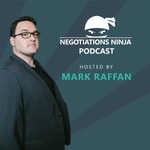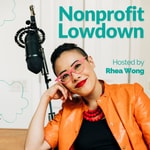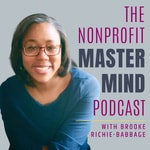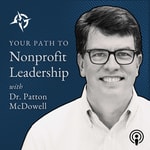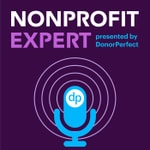Small Nonprofit: Fundraising Tips, Leadership Strategies, and Community-Centric Solutions – Details, episodes & analysis
Podcast details
Technical and general information from the podcast's RSS feed.

Small Nonprofit: Fundraising Tips, Leadership Strategies, and Community-Centric Solutions
Further Together: Fundraising Strategies for Nonprofit Organizations
Frequency: 1 episode/9d. Total Eps: 289

Welcome to Small Nonprofit, the podcast designed for leaders, fundraisers, and advocates in the nonprofit sector who want to create real change. We provide small nonprofit organizations with strategies to enhance their fundraising campaigns, improve nonprofit governance, and implement ethical fundraising practices that resonate with today’s values-driven donors.
Hosted by an experienced nonprofit consultant, Maria Rio, this show delves into the unique challenges of nonprofit fundraising and community-centric fundraising, providing tools for donor engagement and major gifts fundraising.
👤 Who Should Listen?
This podcast is perfect for anyone involved in a small nonprofit seeking practical advice on fundraising strategy, nonprofit leadership, and board accountability. Whether you're looking for innovative fundraising ideas for nonprofit organizations or trying to create an impact measurement framework that demonstrates your organization’s value, Small Nonprofit is here to guide you.
🎤 Core Topics We Cover
Community-Centric Fundraising: Learn how ethical fundraising practices can strengthen donor relationships, enhance donor engagement, and align your organization with values-based major giving principles. We’ll help you shift from a donor-centric model to one that prioritizes the community.
Systemic Change and Governance: From participatory budgeting to nonprofit board of directors best practices, we explore how to navigate the nonprofit industrial complex and embrace structures that foster diversity in nonprofit leadership and board accountability.
Preventing Nonprofit Burnout: Tackle topics such as nonprofit burnout prevention and learn how to cultivate a healthy, anti-oppressive work culture that supports your team’s well-being.
Nonprofit Storytelling: Understand how to measure your nonprofit’s effectiveness through nonprofit impact measurement strategies and leverage nonprofit storytelling to create compelling narratives that attract donors.
📣 Engaging Conversations and Real-World Advice
In each episode, we bring you insights from experts in fundraising consulting, nonprofit grant writing, and capital campaign strategies. From interviews with fractional fundraisers and major gift officers to deep dives on fundraising tips and innovative fundraising ideas, we offer actionable advice that you can implement immediately to strengthen your organization’s impact.
💰 Learn How to Build a Sustainable Nonprofit
Every nonprofit leader faces the challenge of achieving financial sustainability. Our episodes address critical fundraising strategies for nonprofit organizations, providing insights on volunteer management, capacity building, and nonprofit marketing strategy. Gain access to tools that help you execute successful fundraising campaigns and build a foundation for long-term growth.
🤝 Join the Movement for Systemic Change
At The Small Nonprofit, we’re committed to transforming the nonprofit sector from the ground up. Our focus on systemic change and community-centric fundraising aligns with our mission to support nonprofits in creating equitable, sustainable communities. By addressing topics like values-based decision making and nonprofit transparency, we’re working to build a more ethical, inclusive sector.
❤️ Stay Connected
Subscribe to Small Nonprofit on Apple Podcasts, Spotify, YouTube, or your preferred podcast platform. Don’t miss an episode as we explore everything from fundraising tips to nonprofit social media strategy, and learn how you can become a stronger advocate for your organization’s mission.
Recent rankings
Latest chart positions across Apple Podcasts and Spotify rankings.
Apple Podcasts
🇨🇦 Canada - nonProfit
28/07/2025#68🇺🇸 USA - nonProfit
28/07/2025#11🇨🇦 Canada - nonProfit
27/07/2025#63🇺🇸 USA - nonProfit
27/07/2025#8🇨🇦 Canada - nonProfit
26/07/2025#52🇺🇸 USA - nonProfit
26/07/2025#25🇨🇦 Canada - nonProfit
25/07/2025#44🇺🇸 USA - nonProfit
25/07/2025#15🇨🇦 Canada - nonProfit
24/07/2025#31🇺🇸 USA - nonProfit
24/07/2025#7
Spotify
No recent rankings available
Shared links between episodes and podcasts
Links found in episode descriptions and other podcasts that share them.
See allRSS feed quality and score
Technical evaluation of the podcast's RSS feed quality and structure.
See allScore global : 53%
Publication history
Monthly episode publishing history over the past years.
Nonprofit Marketing Strategy: Mastering Nonprofit Messaging with Kathryn LeBlanc
Episode 42
mardi 3 septembre 2024 • Duration 30:21
Do donors realy know what you do and how you do it? Join us for an insightful conversation with Kathryn LeBlanc, a communications consultant specializing in social impact. Kathryn shares her expertise on overcoming common nonprofit messaging challenges, creating concise and emotionally resonant messages, and developing strategic communications plans.
Discover how to craft messaging that resonates with your audience, builds your nonprofit’s brand, and drives action. From crafting a one-liner to rolling out a full communications strategy, this episode is packed with actionable advice for nonprofits looking to enhance their communication efforts.
Nonprofit Marketing Strategy: Mastering Nonprofit Messaging – The Highlights:
- Why concise messaging resonates better with donors and supporters.
- How to identify and narrow your nonprofit's target audience.
- Building your nonprofit's message guide and communication strategy.
- Tips for operationalizing your messaging across teams.
- How to bridge gaps between internal and external communications.
🎧 Listen to more episodes for actionable fundraising tips and insights on nonprofit leadership, nonprofit governance, productivity & tools, and donor engagement strategies that work! We're here to eliminate nonprofit burnout and boost your donations!
About Kathryn LeBlanc:
Kathryn founded LeBlanc (& co.) Communications, an agency that uses strategy, brand design, campaigns, and training to help social impact organizations fulfil their missions and drive social change. They serve a roster of local, national, and international clients that advance social good. Their client base includes nonprofits, philanthropy, labour, government, and mission-aligned businesses.
Actionable Tips for Clear Nonprofit Messaging:
- Create a Message Guide and Communication Strategy: These documents should be separate, clear, and shared consistently across your team.
- Focus on Building Internal Cohesion: A well-aligned team is better equipped to handle both day-to-day communications and unexpected crises.
- Develop a Crisis Communications Plan: Create a plan outlining how your organization will respond to incidents, emergencies, and crises. Assign roles, establish protocols, and train your team regularly to ensure a swift, unified response when needed.
Resources and Links:
- Kathryn LeBlanc's Communications Consulting Firm
- Downloadable Communication Strategy Template
- Connect with Maria
- Connect with Kathryn
- Watch this episode on YouTube.
Addressing Funding Challenges for Women of Color Nonprofits with Carmen Randolph
Episode 41
mardi 27 août 2024 • Duration 35:32
Have you heard of the "Shift the South" report? Join Maria Rio and Carmen Randolph, CEO of the Women’s Foundation of the South, as they shed light on the critical funding challenges faced by nonprofits serving women and girls of color in the U.S. South. In this thought-provoking episode, Carmen discusses the disparities in philanthropic investment, the impact of systemic inequities, and actionable strategies to support nonprofits addressing these issues.
Highlights include insights into grantmaking trends, overcoming legal challenges, and how organizations can diversify funding to build resilience. Whether you're a donor, nonprofit leader, or advocate, this episode is packed with valuable lessons for driving equity and change.
Addressing Funding Challenges for Women of Color Nonprofits – The Highlights:
- The unique funding challenges faced by nonprofits led by women of color in the U.S. South.
- The intersection of systemic inequities like racism, patriarchy, and lack of prioritization for the South.
- Legal challenges nonprofits face following the repeal of affirmative action.
- Innovative strategies to diversify funding sources for resilience.
- Key findings from the upcoming "Shift the South" report.
🎧 Listen to more episodes for actionable fundraising tips and insights on nonprofit leadership, nonprofit governance, productivity & tools, and donor engagement strategies that work! We're here to eliminate nonprofit burnout and boost your donations!
About Carmen Randolph:
Over the course of her 25-year career in philanthropy, Carmen has worked hard to successfully galvanize funders, donors, policymakers, and grassroots activists to forever change lives, systems, and communities for good. She is particularly passionate about building prosperity for women and girls of color and firmly believes in the ineffable power a sisterhood holds to support, nurture, and amplify one another – this is why she always makes a point of collaborating with other women in philanthropy to inspire and guide each other. She is presently a fellow in the Aspen Institute and the Neighborhood Funder’s Group Philanthropy Forward initiative, and was recently invited to join Fortune’s Most Powerful Women Membership.
Actionable Tips for Nonprofit Leaders:
- Engage in Legal Preparedness: Nonprofits should conduct legal reviews of their operations and documents to prepare for potential lawsuits, especially those focused on racial equity.
- Proactively Educate Donors: Engage donors about the importance of continued support for marginalized communities and the potential challenges your organization may face due to shifting legal landscapes.
- Diversify Funding Streams: Look at your nonprofit's work through various lenses to attract funding from different sources.
Resources and Links:
- Women’s Foundation of the South Website
- Shift the South Report
- Connect with Maria
- Connect with Carmen
- Watch this episode on YouTube.
Building Meaningful Nonprofit Community Engagement with Ashley Alaniz-Moyer
Episode 32
mardi 25 juin 2024 • Duration 32:15
Struggling to connect with your service users and donors in a meaningful way? On this episode of Small Nonprofit, Ashley Alaniz-Moyer, Executive Director of the Hispanic Scholarship Consortium and co-founder of Refuerzo Collaborative, shares her insights on refreshing your approach to community engagement.
Ashley and Maria discuss innovative ways to build community, reimagine nonprofit events, and foster meaningful engagement among board members, donors, and volunteers.
Meaningful Nonprofit Community Engagement – The Highlights:
- Strategies for hosting engaging nonprofit events that build community.
- How to create a sense of belonging among volunteers and attendees.
- Using innovative methods like multi-step programming to increase retention.
- Tips for fostering community within nonprofit boards.
- Real-world examples of how creative events can deepen impact and connection.
🎧 Listen to more episodes for actionable fundraising tips and insights on nonprofit leadership, nonprofit governance, donor engagement, productivity & tools, and donor engagement strategies that work! We're here to eliminate nonprofit burnout and boost your donations!
About Ashley Alaniz-Moyer:
Ashley has over 15 years of experience working in nonprofits with roles focused in operations, fundraising, marketing, communications, and events. Ashley believes in combining communication and collaboration for maximum impact. She has successfully planned major events that have launched regional education movements.
She has led organizations through rebranding efforts and strategic planning processes. Her passion for community building shines through as she shares stories and examples of successful engagement strategies.
Links and Resources:
- Hispanic Scholarship Consortium Linkedin: https://www.linkedin.com/company/hispanic-scholarship-consortium
- Hispanic Scholarship Consortium Facebook, Twitter, & Instagram - @hispanicscholar
- Hispanic Scholarship Consortium Website - hispanicscholar.org
- Refuerzo Collaborative Instagram & Facebook - @refuerzocollaborative
- Refuerzo Collaborative Website - refuerzocollaborative.com
- Connect with Maria on LinkedIn: http://www.linkedin.com/in/mariario/
- Support the show: https://www.buzzsprout.com/208666/supporters/new
- Watch this episode on Youtube: https://youtu.be/2Qqv_oDwSqA
the power of "no" with Dr. William Clark
Season 8 · Episode 19
lundi 16 mai 2022 • Duration 26:25
When you’re a small nonprofit, it’s hard to say no to any opportunity that comes your way. After all, you want to make the most out of every single day and help as many people as possible. But if you try to take on too much, it can be a detriment to your effectiveness as an organization. When should you say yes vs. no?
We're talking with Dr. William Clark, founder of Eli Patrick & Co. which provides fundraising consulting to nonprofits. He has over 15 years of experience working in city government, nonprofit administration, and public housing operations. Dr. Clark assists nonprofits with developing sustainable revenue strategies and identifying talent acquisition solutions for growing businesses.
Myths that Dr. Clark wants us to walk away from:
- Saying NO will cost you opportunities: In making important decisions, we need to think about things more intentionally rather than being driven by the need of the moment, which is most likely revenue for small nonprofits.
- You are always in control: If things didn't work out in your favour, remember that there are forces bigger than you that may have contributed to this as well, forces you couldn't and will never be able to control. You must accept the fact that you will not always be in complete control.
Dr. Clark’s Tips on the power of "no"
- Know your capacity. One of the questions you can ask yourself is: Can you do the job? It is a question of skill, talent, money and partnerships and everything that goes into running a successful business, or non-profit.
- Communicate. Communicate consistently with folks that you work with, your consultant, your colleagues, and your board to get different perspectives and advice.
- When you said no when you should’ve said yes. Every organization has its ups and downs. It's fine to rethink things and reevaluate how we proceed so that we can build up this account of goodwill with the various people with whom we were doing business.
Post your favourite quote on social media to share with us!
“Giving yourself space to grieve, grieve in the moment, grieve in potential loss, grieve in potential failure, grieving the fact that your view of yourself is not necessarily consistent with the situation. Grieve in the fact that some people may look at you slightly differently and it might not be favourable because of changes that they may blame you for. So I think a lot of it is just processing through. And as you've worked through that, you don't want to stay in that moment way too long, because there's still work to be done. There are still clients who are looking to you for services and resources and they need you. And so you need to process through these things, but get up, dust yourself off, get back on that horse. Learn from what happened and grow ”
“ When it comes to yes-no, it’s just understanding the moment and living in that moment and responding as best as you can. And lastly being okay with that response. ”
Resources from this Episodeinvolving your board in fundraising with Elizabeth Abel
Season 8 · Episode 18
lundi 9 mai 2022 • Duration 26:30
We constantly hear that if you don't have a fundraising board, you won't be able to raise funds as an organization. I don't believe that! In fact, I’ve had a lot of fundraising success without board fundraising. I know - call all the “gurus” and report this sacrilegious statement!
How do we build a board that is all the things we require in leadership (subject matter experts, lived experience, community members) AND get them to love and embrace fundraising?
In this episode of The Small Nonprofit Podcast, we talk to Elizabeth Abel, about how to motivate board members to fundraise. Elizabeth is the Senior Vice President at CCS Fundraising, a global fundraising consulting firm for nonprofits and an instructor at the University of Pennsylvania. She has designed, advised, and directed development initiatives and capital campaigns that have collectively raised nearly half a billion dollars, positively impacting tens of thousands of lives.
Myths that Elizabeth wants us to walk away from:- Board members can’t be involved in fundraising: Board members can be one of the greatest assets to any nonprofit's fundraising efforts because they champion your mission, engage their networks and provide financial support.
- Board members should focus on major gifts: You need to figure out how your board members want to be involved in fundraising, find out what are their strengths? And then how can you create that synergy that allows them to be fantastic multipliers and fundraising ambassadors?
- Corporate giving is better than individual giving: According to Giving USA 2021: The Annual Report on Philanthropy for the Year 2020, individuals drove 69% of total giving in the US, which was about $324 billion. Corporations are estimated to have declined by 6.1% in 2020 to only about 17 billion. So there is a huge gap between where people think corporations are and where they are relative to individuals.
- Fundraising Ambassadors. They bring a diverse set of experiences and skills and talents. They are multipliers of all that you're doing programmatically, operationally, and of course your philanthropy.
- Recruiting and Engaging Boards. Many people just don't necessarily know what's expected of them so you can begin with setting expectations and educating board members in their role in fundraising.
- Best practices. When considering how our board members can support our fundraising efforts, we want to prioritize relationship building. Elizabeth uses small events to engage and connect with donors as an example.
“It's figuring out the ways in which your board members want to be involved in fundraising, what are their strengths? And then how can we create that synergy that allows them to be fantastic multipliers and fundraising ambassadors? ”
Resources from this Episodeleading with "nice" with Mathieu Yuill
Season 8 · Episode 17
lundi 2 mai 2022 • Duration 34:33
What makes a good leader? If you’re an executive director in a nonprofit, you're probably thinking about how you can be more effective and motivate your team to create a bigger impact. But what are these qualities you should have to inspire others?
To learn more about what makes a great leader, I sat down with Mathieu Yuill, Founder of Leading with a Nice, consultancy that develops leaders. Mathieu has more than 25 years of experience in the field of communication and marketing, as well as a master's degree in management and leadership.
Myths that Mathieu wants us to walk away from:
- Leaders only give orders. Leaders who inspire their employees are those who practice empathy, listen, and genuinely care about their employees' well-being rather than just the work.
- Leaders should hide any weaknesses. Honesty and trust are qualities of a good leader that requires being vulnerable, assessing one's own weaknesses, and communicating them to one's team.
Mathieu’s GET HG: qualities of leaders that inspire
- Gratitude: Checking in with your staff and simply asking how things are going or offering them help is a way to express gratitude because you trust the person to do their job. You're also acknowledging that they're working hard and that you appreciate it.
- Empathy: Stepping into other people’s shoes to understand their circumstances. A leader who shows empathy toward their employees reduces employee absenteeism and has a more productive team.
- Trust: It is all about intent. By communicating your desired outcome to your team and trusting them to choose the best path forward.
- Honesty: It is about understanding your own weaknesses and releasing control.
- Generosity: It is simply a matter of making time to mentor your employees and check in with them.
Favourite Quotes from Today’s Episode
Post your favorite quote on social media to share with us!
“So if you have a report who's working on a project often what we do is we'll come by and be like, “Hey, you know, are you done with that yet? Or how far along are you?” That's checking up and that's like a doctor's appointment. Nobody likes it. But instead, check-in and be like, “Hey, how are things going? Is there anything I can help you with?” That's actually showing gratitude and trust cause you're trusting the person they're doing their job and you're also acknowledging that they're working hard and you recognize like, “Hey, can I help you? Like I get this is a job that might need an extra set of hands.” That's a very simple way to show gratitude.”
”We need to understand how to communicate with each other and that's really the first base, the barrier to entry is do you know how to communicate with each other? ”
Resources from this Episode
are you ready for a capital campaign?
Season 8 · Episode 16
lundi 25 avril 2022 • Duration 42:19
A lot of people think that once they decide they want to start a capital campaign, they can just jump right in and start raising money. But it takes a lot of planning and preparation to make sure your campaign is successful. So, how do you know if your small nonprofit is ready to launch a capital campaign?
On today's episode, we’re talking all about Capital Campaigns with Sabrina Walker-Hernandez, Certified Consultant, Coach, Facilitator & Best Selling Author helping small nonprofits build relationships that convert into more donations. She's worked for 25 years in our sector from direct services operations all the way to executive leadership, and she took an organization with an annual budget of 750,000 to 2.5 million a year operations and launched a $12 million capital campaign in the US's third poorest county.
Myths that Sabrina wants us to walk away from:- You can start a capital campaign right away: If you are a small nonprofit, you need to build your annual campaign before you go into a capital campaign because capital campaigns are all about individuals and relationships. And you want those individuals connected to you and your work before you ask them to dig deep into their pockets.
- You can ask any of your donors to give to your capital campaign: Yes - you can ask each and every donor to give towards your capital campaign (it’s not just about the big gifts), BUT you really need to have a relationship with them before you go and ask them for a special gift. You can't take a person from zero to $250,000.
- Relationships first. Start with individual giving as you build your foundation. You have to have a relationship with people before you go and ask them for the amount of money that you're going to need to complete a capital campaign.
- Feasibility Study. Have a conversation with the individuals in the community to let them know about what you want to do and share your vision. Seek advice from people who want to be part of the campaign.
- Identify the key person. The executive director doesn't necessarily have to lead, but you can identify a co-chair to lead the campaign or even hire a consultant that can guide you through the campaign.
- Phases of the campaign. You can start to secure your top gifts from your top donors and board members first. Depending on your strategy, you can also have mid-level, the corporate approach, and the foundation approach. Lastly, you can also have a community approach to get everyone involved.
Post your favorite quote on social media to share with us!
“People will follow success. When we first launched this capital campaign and we talked about $12 million, people did not think it could be done. So we had to come out strong and so people will follow success, invest upfront in getting those top donors on board. It will break or make your capital campaign.”
shared platform/fiscal sponsorship 101 with Lizzie Howells
Season 8 · Episode 15
lundi 18 avril 2022 • Duration 42:44
Charity vs. Nonprofit. You may or may not know that those two have different meanings! They both doing amazing, mission-centred work! But there are more rules and regulations for charities (if you’re in the US, that’s a 501c3) which means it takes a lot more time and resources to get going.
Many nonprofits have aspirations to become a charity, but one of the biggest questions I get asked along the way is - “how do we fundraise without charitable status?” You see - nonprofits cannot issue tax receipts to donors.
Now - the short answer is that donors are not giving for the receipts.
But the long answer is that there is a formal structure - in Canada called a Shared Platform and in the US Fiscal Sponsorship - that allows emerging nonprofits to issue tax receipts and then some!
There are lots of reasons why this model is growing in popularity. So much so that Mackenzie Scott herself invested in today’s podcast guest’s organization - to the tune of $18.9 million.
Join me for this conversation all about Shared Platforms with Lizzie Howell, Director, Shared Platform at MakeWay. With MakeWay’s shared platform, changemakers share a suite of centralized organizational supports, and coaching when needed, so more time and money can go towards building strong, vibrant, just communities and a healthier planet.
Myths that Lizzie wants us to walk away from:- Only big organizations can host a Shared Platform. MakeWay is unique in that they are the only Shared Platform host that has gone through an audit - so they have formalized the operations of Shared Platforms in accordance with Canada Revenue Agency. However, there are many smaller charities that also act as a Shared Platform for nonprofits that are aligned with their work.
- It’s just about issuing tax receipts. Established Shared Platforms do much more than allow your nonprofit to issue receipts for donations. They offer structure and support to help grow your impact.
- Support: As part of a shared platform, you can have access to a wide range of operational administrative support on the backend including financial management, human resources, grounds administration, charitable compliance, risk management. You get to focus on doing the work that you want to do, and create change in the community.
- Efficient: It's a way to operate within the charitable sector that's far more cost and time effective than becoming a new charity.
- Expertise: MakeWay has a great governance structure set up to support projects where they each have a steering committee who are responsible for providing strategic advice and direction for projects.
“We really value the autonomy of projects to be able to make their own decisions around things like compensation, and again, different groups have, different values in terms of who they hire and what that looks like and at MakeWay, overrule, we have a commitment to equity, to economic well being, and we realize that we're in a position where we were providing guidance advice, and of course, with the legal employer.”
Resources from this Episodeleadership with Kishshana Palmer
Season 8 · Episode 14
lundi 11 avril 2022 • Duration 36:18
Nonprofit leaders are always trying to do more with less. There never seems to be enough time in the day or enough resources to handle everything that comes along, but you still have to manage and lead your organization effectively.
In today’s episode, we’re going to talk about leadership and management with Kishshana Palmer. Kishshana is an international speaker, trainer, and coach with a 20+ year background in fundraising, marketing, and talent management. When an organization wants to grow, find and retain people on their team, raise money, and more she is the fairy godmother they have on speed dial.
- You can do it all. As a leader, you don't need to push yourself until you're exhausted because you think you have to. Invest in the systems and people around you that will allow you to let go of things and focus on what you do best.
- You don’t have enough time. Understanding how you work, what time of day it is, what fuels you, and where you busy yourself, so you don't have to do your work, this is everything you need to know if you want to regain control of your calendar.
- Taking rest and break: We have to rethink the way we approach rest. We need to release what used to work. And now start thinking about what is going to satisfy you in your adult life in this new season.The idea of bringing in play into the work is so important in order for us to start to grab those small pieces of reset that we need.
- You have agency and control: You are the CEO of your responsibilities within the organization, regardless of your title in your organization. Understanding that you're actually in control of a lot more than you might think is critical when navigating the power dynamics within your organization.
- Leveraging resources: Leveraging tools and systems, developing your people and spending those dollars so that as you continue to grow. As you continue to deepen roots, you'll do so in a way that's healthy, that continues to attract folks who are there for longevity who want to have ties both to their work and ties to the community in a different kind of way, and who are healthy at work.
Post your favorite quote on social media to share with us!
“Let it be the last year that at 2022, that I utter this foolishness because I want to be in a place where if something were to happen to me or if I just wanted to take a darn break that I have hired capable folks who can take on the work that needs to be done, to be able to move the ball down the field.”
Resources from this Episodefrom team to dream team with Ashlee Livingstone
Season 8 · Episode 13
lundi 4 avril 2022 • Duration 38:48
The pandemic has changed the way that many teams work. More people are working from home, or in a hybrid arrangement. And as we rethink our culture, many of us wonder how we can cultivate a sense of connection and create a unique and meaningful team culture in this ever-changing world?
In today’s episode, we’re going to talk about how to build team culture with Ashlee Livingstone, CEO of Our Forté. She has built her career creating curated and memorable experiences for people, and works collaboratively with leaders in building stronger cultures to help teams thrive.
Myths that Ashlee wants us to walk away from:- Building team culture costs a lot of money. Applying humans first approach in teams does not have to cost you money. It just has to cost you time to focus on engaging with your team and making them feel that they matter.
- Team culture is all about company events. You need to do the foundational work ahead of time to build that team and show ongoing connection with them so that when it's time to have a year end celebration or a halfway point celebration, people are actually excited to go.
- Engagement: Engagement is about connecting with your team and how are they connecting with each other? It is important for leaders to keep their current team members engaged and feeling connected to their colleagues.
- Development: Development looks like mentorship. It looks like understanding what your team member's goals and future is and what they want, not just what you see in them.
- Gratitude: To show gratitude you have to really know your team and you can ask them questions such as how do you like to be appreciated? What motivates you?
- Experience: Experience is about making your team feel empowered and heard. Helping them to enhance their experience at work.
Post your favorite quote on social media to share with us!
“We can easily replace that person, people are replaceable, that mentality, even if you say it a couple of times, or you try and say it jokingly, that seeps into people. And so we guess the work that they're doing matters, but if they think they're replaceable or you can easily replace them, that's where they're not gonna feel connected to what they're doing.”
“At the end of the day, people want to be seen and they want to be heard and they want to know that they matter.”
Resources from this Episode